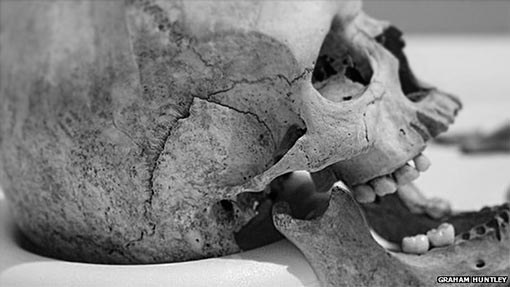Anybody missing a cleaning lady?

As we discussed below, they are ALlllways digging up stuff here. Every time they enlarge a parking lot or put an extension on an elementary school, they find some lot of poor skeletons huddling underneath.
Know what happens to them? Unless there’s treasure buried with them, not much. They’re catalogued, packed away in boxes and stored by the county council, more or less unexamined. There’s all kinds of stuff they can learn from DNA analysis and tooth enamel these days, but that shit costs money. And, as I said, there are so many, many old bones lying around.
We watched a program recently that went back and looked at some pretty ordinary Stone Age bones stored away in a warehouse somewhere. They discovered little holes drilled in many of them, post mortem. From the position, they deduced the holes were used to articulate the skeletons. Thing is, they weren’t awfully fussy that the right man’s leg bone was connected to the right man’s hip bone.
So, think on that. They were — I guess — digging up the ancestors, stringing skeletons together from random bits and — I dunno — hanging them up at parties? Does that blow your mind? That blows my mind.
Every once in a while, a local council gets a lottery grant to do some actual archeology, which recently happened in Eastbourne. They had 300 skeletons kicking around in storage, from 1,500 to 4,000 years old and they got £72,000 to do some science on them.
They dated and sexed them all (my goodness, that doesn’t sound nice) and singled out 12 for particular analysis. That lady in the header was the real surprise. She lived her whole life in Sussex and was buried in Roman times, about 245 AD, but she’s from sub-Saharan Africa. The Roman empire didn’t extend that far. What’n the heck was she doing here?
She was healthy, lived to about 30 and grew up on a plentiful diet of fish and vegetables. Wife, mistress, slave. They have no idea.
I guess I just thought we knew a whole lot more about early Britain — or, at least, had done everything we could to find out. Turns out, not.
April 1, 2014 — 10:08 pm
Comments: 5












